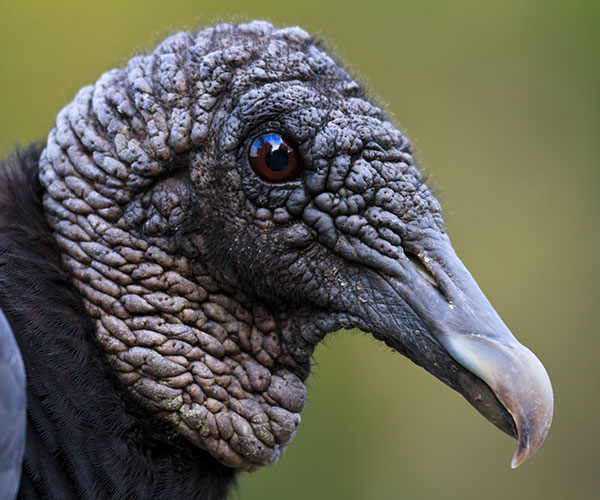Gamecock Scientists Say “Vultures Need Love”
08/26/2023

by Brett Buckner
Bee Gray loves birds – all types – but the birds that have a special place in their heart make most people shout, “Eeeeewwww!”
“I’ve got a thing for vultures, I can’t help it,” said Gray, who recently received a Master of Science in biology from JSU. “They just don’t get the attention they deserve. I know most people think they’re pretty gross, but really, vultures clean up our environment. They’re making the world a better place and are a huge benefit for us.”
Gray’s ability to see the beauty in the nastier corners of nature led to a partnership with Dr. Ashley Turner, assistant professor of biology. Together, they co-wrote a research grant awarded by the Alabama Ornithological Society to support and fund Gray's thesis project in Turner’s research lab.
The title of Gray’s thesis was “Characterization of Antimicrobial Properties of Excrement and Functional Microbiome of Black Vultures (Coragyps atratus).”
“Basically, we wanted to find out why vultures poop on their legs,” Dr. Turner said. “Bee’s hypothesis was, essentially, ‘Are vultures using their poop like a hand sanitizer? Are they gaining some benefit from doing this while standing in carrion, this rotting meat, which brings them in contact with all these nasty microbes. Do they use this behavior to keep clean?’”
It wasn’t a stretch, given what Gray already knew about vultures.
“Vultures are known to perform what’s referred to a Urohidrosis,” Gray explained. “Basically, they poop on their legs, it cools them down, like sweat. That’s what made me wonder if there was a second purpose as well.”
Gray posed the question to Dr. Turner, who is a geneticist, and the project took off. They wrote the grant proposal over Christmas break and submitted it in spring.
“It was that quick,” Dr. Turner said. “It was Bee’s idea, and I knew that I had the contacts, and the experience, to guide and support it.”
They were awarded $1,000 from the Alabama Ornithological Society. “I was so excited,” Gray said. “It was really the high point of my graduate studies.” Studying vultures was not something Dr. Turner ever expected to do.
“I’m a person who’s always open to new ideas,” Turner said, “so when we started talking, I wasn’t even worried that I’d never worked with vultures. I was just so focused on the research question and working with Bee and sort of knowing that I could help carry this out – the vulture excrement wasn’t even a focus, I was just focused on the question.”
Dr. Turner leads a team of student researchers in The Worm Hole research lab on campus, utilizing the microscopic roundworm C. elegans as a model system for exploring gene function and evolution and molecular mechanisms of disease. She’s also worked with mice, rats, flies and zebra fish.
“But I’ve never actually worked with an animal out in the wild, so that was a little different angle for me,” she said. “That’s probably why I was so open and excited about it.”
Before attempting to gather wild samples, Gray gave Dr. Turner a bit of advice.
“Bee warned me, when we were doing our surveys out in the wild, to be careful and not scare the vultures or they will vomit on you,” Turner said. “Their vomit is very acidic. It can burn.”
They originally laid a deer carcass on a tarp out in the woods, but the vultures never arrived.
“The tarp scared them off,” Bee said. “Animals, especially vultures, are a lot smarter than we think they are, so they knew something was up.”
So Gray and Dr. Turner collaborated with the Birmingham Zoo, who let them collect samples from its three black vultures.
“We basically waited around for the vultures to do their thing,” Gray said. “Then we would scoop it up. The zoo helped us out with this and picked up samples as well.”
Those samples were sent to UAB to help work up the community of microorganisms, or microbiomes.
“When we were looking at the microbiomes of the vulture’s excrement,” Gray said, “we found that it did help inhibit the growth of certain types of bacteria. Now that we know that the vulture excrement has some anti-microbial properties, further research could be conducted against ESKAPE pathogens – which are a group of pathogens known for causing many infections in hospitals – and other common pathogens.”
Future research could lead to the development of new antibiotics. Gray also explains that studying vultures helps us understand how they fill the role they play in their environment as carrion consumers.
Having graduated with a master’s degree and successfully defended her thesis, Gray has accepted an adjunct teaching position with JSU, and plans to pursue a Ph.D. in the future.
“I’m sure I’ll keep researching vultures,” Gray said. “They deserve more love.”

